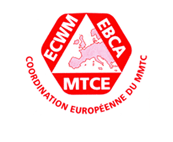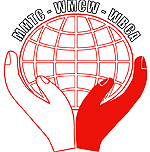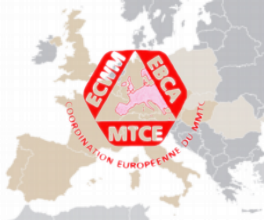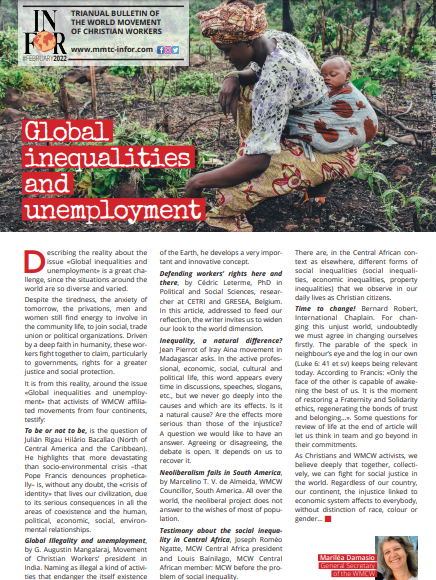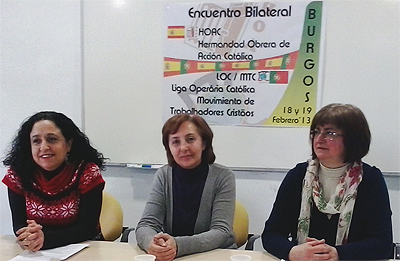 COMMUNIQUÉ
COMMUNIQUÉ
Burgos, 19th February 2013. The executive team of the LOC/MTC (Liga Operária Católica - Movimento de Trabalhadores Cristãos**) and the permanent commission of the HOAC (Hermanda Obrera de Acción Católica***) held their annual coordination meeting from 17th to 19th February in Burgos to share and to analyze together the life and efforts of the activists – male and female – of both movements and the current state of the working environment and the Church in both countries.
As a starting point, we affirmed the similarity of both countries with respect to:
- the high rate of existing unemployment, which has increased this last year and the worrying prospect that this increase will continue steadily.
- the latest labor reforms have not avoided job losses, but have further deteriorated working conditions and job instability and set back collective negotiation.
- indecent wages, often a pittance, are leading to the creation of a sector of poor workers, in spite of their jobs
- smear campaigns directed at the workers' organizations
- this situation has reduced the workers' purchasing power and has conditioned their lives, forcing them to renounce minimally decent standards of living.
- insecurity has increased, fear and uncertainty about the future have increased.
- thousands of qualified young people from both countries must leave their homes and families to find a future in other countries
The reality that we live in leaves no doubt. The way in which we organize our social life does not place the human being at the center: the person is not the priority, economic yield is. The result is obvious: working men and women, especially the weakest, most excluded people and families, are the victims upon whom falls the weight of the consequences of the crisis. The latest cases of corruption discovered in various economic and political organizations disillusion society. Hunger, depression, suicides, etc. are painful consequences of a savage, neoliberal, capitalist economic and social system, which structurally is unjust and distances itself from God's plan of a world full of brothers and sisters. The Church is very clear in this sense and reminds us in the Catechism that “merchants whose commercial, usury practices cause hunger and death of their brothers, commit homicide indirectly. This is imputable to them.” (CIC 2269)
Policies of privatization and austerity imposed by the European Union and the financial and economic powers that be, to which our governments have completely capitulated, have not solved the problems of public deficit or payment of the debt. We understand that some of the main causes of this situation of rapid impoverishment of individuals and whole families are the political decisions that are being made and their disastrous consequences.
This reality makes us ask ourselves what kind of Europe we have today and what Europe we would like to have and should build. A Europe with rich and poor countries, where there is no respect for social rights attained with great effort by the labor movement and so many men and women who have changed history to obtain them?
This social reality generates much suffering. Many people need to feel that things can change and that their lives and those of their families can be structured in a different way; to feel that fellowship and communion strengthen personal and social relationships; to confirm that the political system, political and economic institutions, laws and decisions strive for the common good; to verify that they are the protagonists of their own lives… They really need, we need, Good News for the poor. We understand that the situation is so urgent for so many families, that an immediate answer is necessary, but we cannot content ourselves with these answers. Charity needs justice to be true charity. We have to analyze the causes of this situation of impoverishment to be able to fight it and to try to turn around the situation of regression of social rights and bankruptcy of democracy.
As movements of the Church in the working-class environment and the workplace, we want to disseminate and experience the Good News of Jesus Christ throughout our thread of reality. Through our conscience of workers and Christian workers, we ask ourselves what is happening to social life and political action that, far from responding to the necessities of the whole person and all people, is impoverishing and dehumanizing them. In spite of this, we need to say loud and clear that other policies are possible and necessary.
Jesus of Nazareth time and time again invites us in the Gospel to stand by the most needy, to pay attention to the lowly, to approach those that “are seated by the side of the road” (Lc 18, 35); for that reason through the Gospel we wish to announce that yes it is possible to build a social life and develop a political action that really places all men and women as the point of focus, which affirms that the person comes first. This implies that we must orient our lives, personally and socially, and political activity through communion, through the necessities of the impoverished.
We manifest, also, that God acts in this same reality. Many initiatives by individuals as well as social, political and union organizations show another way to build this reality through political action. Change is possible. Alongside the winds of impoverishment and dehumanization, breezes of solidarity, transformation and hope begin to materialize. Activists of our movements, we must remain observant of all the people and their related events, celebrating and living the force of the Revived One to be able to continue working for a transformative action of the working-class environment and the workplace
